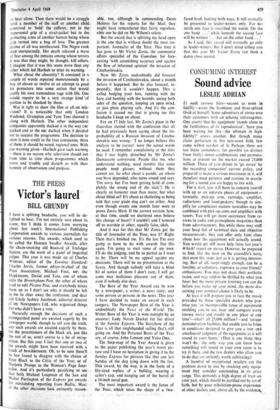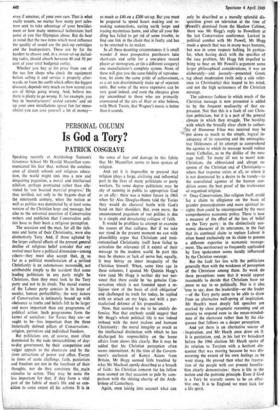Sound advice
CONSUMING INTEREST LESLIE ADRIAN
Et smUj cessura fides—second to none in fidally—wrote the licentious and three-spliced Ovid of himself. Some advertisers of stereo woo their customers with an echoing extravagance. One asserts that his equipment 'stands alone in the faithfulness of its reproduction'; 'have you been waiting for this—the ultimate in high fidelity?' crows another. But though many claim perfection in this tare-sown field, few come within earshot of it. Perhaps there are too many contenders; for possible (as distinct from likely) stereo combinations and permuta- tions at present on the market exceed 25,000 million. Those of you driven to `go stereo' by the recording companies' current policy, and prepared to make a serious investment in it, will therefore need patience and stamina in search- ing for a-sound you are happy to live with.
For-a start, you will have to concern yourslf with up to six separate pieces of equipment— turntable, pick-up arm, cartridge, amplifier, radio-tuner and loudspeakers; though to sim- plify (or complicate) matters turntables may be combined with pick-up arms and amplifiers with, tuners. You will get more sustenance from re- views in audio and gramophone magazines than from advertisements. But while these may stuff your head full of technical data and objective measurements, they can offer only faint clues about how the equipment will actually sound. You would get still more help from last year's Which? report on stereo. However, he prepared to find, like the man on the crocodile's nose, that even this stops just as it is getting interest- ing. Best of all, surprisingly enough, can be a forcible, or voluntary, exposure to your friends' enthusiasms. You may not share their aesthetic tastes, and may seldom be thrilled by what you hear; but the more private listening you can do before you make up your mind, the more dis- cerning your eventual choice is likely to be.
At least it will prepare you to face the music provided by those specialist dealers who pro- mise you 'an incomparable range of equipment enabling you to see, hear and compare every known make and model in one place at one time'—what? all 25,000 million?—and 'unique demonstration facilities that enable you to listen in conditions designed to give you a true and uncoloured judgment of the equipment as it will sound in your home.' (That is one thing they won't do: the only way you can know how something- will sound in your own room is to try it there, and the few dealers who allow you to do that are certainly worth cultivating.)
A handful of exceptional retailers cut the problem down to size by stocking only equip- ment their consider outstanding in its price range. This demands a high degree of trust on your part, which should be justified not by act of faith, but by your tribulation-prone experience of other dealers and, above all, by the evidence„ even if amateur, of your own ears. That is what really counts, no matter how many pert sales- men seek to take advantage of your bewilder- ment or how many unmusical technicians hurl noise at you like Olympian abuse. But do bear in mind that the two items which most influence the quality of sound are the pick-up cartridges and the loudspeakers. These are by far the hardest to choose and, in a stereo set-up includ- ing radio, should absorb between. 40 and 50 per cent of your total budgeted outlay.
Whether you buy at list price from one of the too few shops who check the equipment before selling it and service it properly after- wards, or from the outfit which offers the biggest discount, depends very much on how scared you are of things going wrong. And, believe me, there is plenty to go wrong. If, for example, you buy in 'manufacturers' sealed cartons' and set up your own installations (great fun for maso- chists) you can save yourself a lot of money— as a set you discriminately make up of separate units. But some of the more expensive can be very good indeed, and even the cheapest gives joy unconfined to those who are primarily enamoured of the airs of Hair or who believe, with Mark Twain, that Wagner's music is better than it sounds.



































 Previous page
Previous page